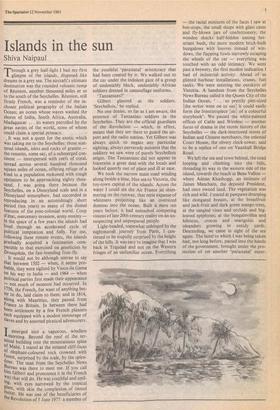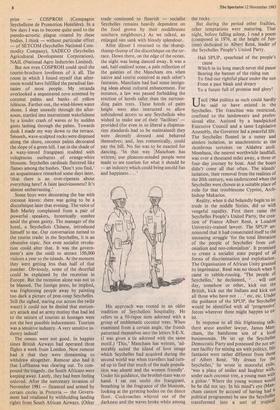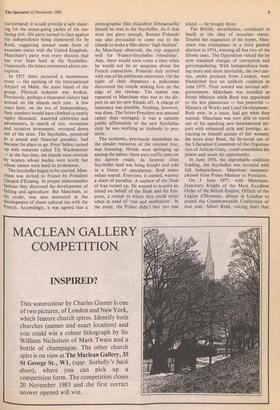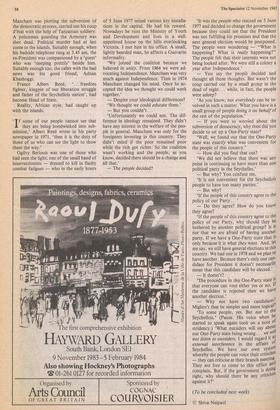Islands in the sun
Shiva Naipaul
Through a grey half-light I had my first glimpse of the islands, disposed like dreams in a grey sea. The aircraft's ultimate destination was the rounded volcanic rump of Reunion, another thousand miles or so to the south of the Seychelles. Reunion, still firmly French, was a reminder of the in- choate political geography of the Indian Ocean; an ocean whose waves washed the shores of India, South Africa, Australia, Madagascar ... its waters patrolled by the great navies of the world, none of whom could claim a special primacy.
, It was not a quest for the exotic which was taking me to the Seychelles: those scat- tered islands, islets and racks of granite — the remains, some say, of a submerged con- tinent — interspersed with reefs of coral, spread across several hundred thousand square miles of ocean, offering refuge of a kind to a population reckoned with rough Optimism to be approaching eighty thou- sand. I was going there because the Seychelles, on a Disneyland scale and in a Disneyland atmosphere, had succeeded in reproducing in an astonishingly short Period (ten years) so many of the dismal features of the post-colonial world. Coup d'etat, mercenary invasion, army mutiny — in the space of a few years the islands had lived through an accelerated cycle of Political temptation and folly. For me, following these remote events, the islands gradually acquired a fascination com- parable to that exercised on geneticists by Drosophila, the fast-breeding fruit-fly.
It would not be although untrue to say that between 1502 — when, it seems pro- bable, they were sighted by Vasco da Gama na his way to India — and 1964 — when Political parties first made their appearance not much of moment had occurred. In 1756, the French, for want of anything bet- ter to do, laid claim to them; and in 1814, along with Mauritius, they passed from Prance to Britain. In between there had been settlement by a few French planters each equipped with a modest entourage of Slaves and by assorted piratical adventurers.
Iemerged into a vaporous, windless morning. Beyond the roof of the ter- Mina' building rose the mountainous spine of Mahe. I stared at the striated cliff-faces of elephant-coloured rock crowned with r.erest, surprised by the scale, by the splen- c_our. The man from the Seychelles News .8.ureau was there to meet me. If you call Mill Gilbert and pronounce it in the French ,way that will do. He was youthful and STIR- '11,g, with eyes narrowed by the tropical tare, with skin the complexion of tinned eager. He was one of the beneficiaries of ne Revolution of 5 June 1977: a member of
the youthful 'parastatar aristocracy that had been created by it. We walked out to the car under the indolent gaze of a group of undeniably black, undeniably African soldiers dressed in camouflage uniforms.
'Tanzanians?'
Gilbert glanced at the soldiers. `Seychellois,' he replied.
No one denies, so far as 1 am aware, the presence of Tanzanian soldiers in the Seychelles. They are the official guardians of the Revolution — which, in effect, means that they are there to guard the air- port and the radio station. Yet Gilbert was always quick to negate any particular sighting, always perversely insistent that the soldiery we saw were of purely Seychellois origin. The Tanzanians did not appear to fraternise a great deal with the locals and looked queerly out of place and ill at ease.
We took the narrow main road winding along beside a blue, blue sea to Victoria, the toy-town capital of the islands. Across the water I could see the Air France jet shim- mering on the runway, that eerie expanse of whiteness projecting like an oversized domino into the ocean. Built a mere ten years before, it had unleashed competing visions of late 20th-century reality on an un- suspecting and unprepared people.
Light-headed, somewhat unhinged by the nightmarish journey from Paris, I con- tinued to be stupidly surprised by the height of the hills. It was easy to imagine that I was back in Tripidad and not on the Western fringes of an unfamiliar ocean. Everything — the racial mixtures of the faces I saw at bus-stops, the small shops with glass cases and fly-blown jars of confectionery, the wooden shacks half-hidden among lux- uriant bush, the more modern brick-built bungalows with louvres instead of win- dows, the flapping fowls narrowly escaping the wheels of the car — everything was touched with an odd intimacy. We went past a brewery, the first modest indication I had of industrial activity. Ahead of us glinted harbour installations, cranes, fuel tanks. We were entering the outskirts of Victoria. A handout from the Seychelles News Bureau called it the Queen City of the Indian Ocean, ' ... so prettily pint-sized [the writer went on to say] it could easily form the frontierspiece [sic] of a colourful storybook'. We passed the white-painted offices of Cable and Wireless — another focus of drama in the recent history of the Seychelles — the dark-interiored stores of Indian and Chinese merchants, the colonial Court House, the silvery clock-tower, said to be a replica of one on Vauxhall Bridge Road, We left the sea and town behind, the road looping and climbing into the hills, threading its way to the western side of the island, towards the beach at Beau ValIon — where Adnan Khashoggi, an intimate of James Mancham, the deposed President, had once owned land. The vegetation was rich and wild. I stared at pawpaws drooping like elongated breasts, at the breadfruit and jack-fruit and dark green mango trees, at the tangled vines and orchids and big- leaved epiphytes; at the bougainvillea and hibiscus, croton and marigolds and oleanders growing in untidy yards. Descending, we came in sight of the sea again. The hotel to which I was being taken had, not long before, passed into the hands of the government, brought under the pro- tection of yet another 'parastatar enter- prise — COSPROH (Compagnie Seychelloise de Promotion Hoteliere). In a few days I was to become quite used to the pseudo-acrostic plague created by these bodies. I think — without particular effort — of SEYCOM (Seychelles National Com- modity Company), SADECO (Seychelles Agricultural Development Corporation), NAIL (National Agro Industries Limited).
But not even COSPROH could spoil the tourist-brochure loveliness of it all. The room in which I found myself that after- noon would have fulfilled the paradisal fan- tasies of most people. My veranda overlooked a sequestered cove screened by coconut palms and banks of yellow hibiscus. Farther out, the wind-blown water shone. I slept uneasily through the after- noon, startled into intermittent wakefulness by a louder crash of waves or by sudden gusts lashing through the palms. Towards dusk I made my way down to the terrace. Smooth, wave-sculpted rocks were disposed along the shore, coconut palms decorated the slope of a green hill. I sat in the shade of a waxy-leaved frangipani studded with voluptuous outbursts of' orange-white blossom. Seychelles cardinals fluttered like flames among the bushes. 'Don't you find,' an acquaintance remarked some days later, 'that there is an over-ripeness about everything here? A faint lasciviousness? It's almost embarrassing.'
Some boys were decorating the bar with coconut leaves: there was going to be a discotheque later that evening. The voice of Bob Marley complained from a pair of powerful speakers, hysterically sombre amid the green gaiety. The manager of the hotel, a Seychellois Chinese, introduced himself to me. Our conversation turned to the tourist trade: in the Seychelles, it is an obsessive topic. Not even socialist revolu- tion could alter that. It was the govern- ment's aim (he said) to attract 150,000 visitors a year to the islands. At the moment they were getting less than half of that number. Obviously, some of the shortfall could be explained by the recession in Europe. But the recession alone was not to be blamed. The foreign press, he implied, was frightening people away by painting too dark a picture of post-coup Seychelles. Still (he sighed, staring out across the twilit water) it could not be denied that mercen- ary attack and an army mutiny that had led to the seizure of tourists as hostages were not the best possible inducements. Tourism was a sensitive industry. A very sensitive in- dustry indeed!
The omens were not good. In happier times British Airways had operated three flights a week from London. Now rumour had it that they were threatening to withdraw altogether. Rumour also had it that Lufthansa was clearing out. To com- pound the tragedy, the South Africans were keeping away. Lately, they had been feeling unloved. After the mercenary invasion of November 1981 — financed and armed by certain circles in Pretoria — the Govern- ment had retaliated by withholding landing rights from South African Airways. (Other trade continued to flourish — socialist Seychelles remains heavily dependent on the food grown by their meddlesome southern neighbours.) As we talked, an enlarged sun sank with bloody splendour.
After dinner I returned to the thump- thump-thump of the discotheque on the ter- race. Down there, on the edge of the ocean, the night was being danced away. It was a sad, half-realised scene, a pale reflection of the gaieties of the Mancham era when native and tourist connived at each other's fantasies. Mancham had had some intrigu- ing ideas about cultural enhancement. For instance, a law was passed forbidding the erection of hotels taller than the surroun- ding palm trees. These hotels of palm height were also instructed to allow unhindered access to any Seychellois who wished to make use of their 'facilities' — provided (for even in so liberal a dispensa- tion standards had to be maintained) they were decently dressed and behaved themselves; and, less romantically, could pay the bill. No fee was to be exacted for dancing. 'In that way [Mancham has written] our pleasure-minded people were made to see tourism for what it should be — an industry which could bring untold fun and happiness ... '
His approach was rooted in an older tradition of Seychellois hospitality. He refers to a 50-rupee note adorned with a group of emblematic coconut trees. When examined from a certain angle, the fronds patterned themselves into the letters S-E-X. (I was given a tie adorned with the same motif.) 'This,' Mancham has written, 'ad- mirably suited the island of love image which Seychelles had acquired during the second world war when travellers had turn- ed up to find that much of the male popula- tion was absent and the women friendly'. Under his guidance, the brothel-state was to hand. I sat out under the frangipani, breathing in the fragrance of the blossom, looking at the gyrating bodies on the dance floor. Cockroaches whirred out of the darkness and the waves broke white among the rocks.
But during the period other frailties, other temptations were maturing. That night, before falling asleep, I read a poem (composed in 1976, at the height of fun- time) dedicated to Albert Rene, leader of the Seychelles People's United Party.
Hail SPUP, spearhead of the people's cause Which in its long march never did pause Bearing the banner of the rising sun To find our rightful place under the sun From a past bleak and dreary To a future full of promise and glory!
Unta 1964 politics as such could hardly be said to have existed in the Seychelles. The franchise was restricted, confined to the landowners and profes- sional elite. Assisted by a handpicked Executive Council and a tame Legislative Assembly, the Governor led a peaceful life. The Seychelles floated in a sunny and aimless isolation, as anachronistic as the slumbrous tortoises on Aldabra atoll. Mombasa, the nearest worthwhile landfall, was over a thousand miles away, a three or four day journey by boat. And the boats didn't come all that often. The islands' isolation, their removal from the realities of the 20th century, was underscored when the Seychelles were chosen as a suitable place of exile for that troublesome Cypriot, Arch- bishop Makarios.
Reality, when it did belatedly begin to in- trude in the middle Sixties, did so with vengeful rapidity. First there came the Seychelles People's United Party, the crea- tion of France Albert Rene, a London University-trained lawyer. The SPUP an- nounced that it had consecrated itself to the unceasing struggle 'for the total liberation of the people of Seychelles from col- onialism and neo-colonialism'. It promised to create a socialist state purged of all forms of discrimination and exploitation. The Organisation of African Unity granted its imprimatur. Rene was no slouch when it came to rabble-rousing. 'The people of Seychelles,' he declaimed, ... will One day, somehow or other, kick out the British, kick out the Indians and kick ont all those who have not ...' etc, etc. Under the guidance of the SPUP, the Seychelles would be identified with all 'progressive forces wherever these might happen to ex- ist.
In response to all this frightening talk, there arose another lawyer, James Man-
cham, the handsome son of a local businessman. He set up the Seychelles Democratic Party and possessed the not titi rare facility for mixing sex with politics. His fantasies were rather different from those of Albert Rene. 'My dream for the
Seychelles,' he wrote in mournful exile,
'was a place of smiles and laughter with, under each coconut tree, a young man with
a guitar.' Where the young women would be he did not say. In his mind's eye (Marl' cham cannot be accused of having had political programme) he saw the Seychelles transformed into a sort of tropical
Switzerland; it would provide a safe moor- ing for the ocean-going yachts of the sea- faring rich. His party turned its face against the independence being clamoured for by Rene, suggesting instead some form of associate status with the United Kingdom. Mancharres party won every election that has ever been held in the Syechelles. Ominously, the losers murmured about cor- ruption.
In 1971 there occurred a momentous event — the opening of the International Airport on Mahe, the main island of the group. Physical isolation was broken. Previously, perhaps a thousand visitors had arrived on the islands each year. A few years later, on the eve of Independence, their numbers would have climbed to nearly eighty thousand. Assorted celebrities and adventurers, in search of rest, recreation and lucrative investment, swooped down out of the skies. The Seychelles, perceive& as a sexual and financial paradise, had become the place to go. Peter Sellers turned up with someone called Titi Wachmeister — in the fun time, the islands were overrun by women whose bodies were lovely but Whose names were hard to pronounce.
The Seychelles began to be courted. Man- cham was invited to France by President Oiscard d'Estaing. In proper statesmanlike fashion they discussed the development of fishing and agriculture. But Mancham, to his credit, was also interested in the development of closer cultural ties with the French. Accordingly, it was agreed that a
pornographic film (Goodbye Emmanuelle) should be shot in the Seychelles. As if that were not glory enough, Roman Polanski was also persuaded to come out to the islands to make a film about 'high fashion'. As Mancham observed, the trip augured well for 'Franco-Seychelles friendship'. Alas, there would soon come a time when he would not be so sanguine about the French connection. Polanski duly arrived with one of his pubescent mistresses. On the night of their departure a policeman discovered the couple making love on the edge of the runway. The matter was reported to Mancham who was at the air- port to see his new friends off. A charge of indecency was possible. Nothing, however, was done. The future President was amused rather than outraged: it was a suitably public affirmation of the new Seychelles style he was working so tirelessly to pro- mote.
The economy, t previously dependent on the slender resources of the coconut tree, was booming. Hotels were springing up among the palms; there were traffic jams on the narrow roads. In faraway cities Seychelles land was being bought and sold in a frenzy of speculation. Real estate values soared. Everyone, it seemed, wanted a share of paradise. A nephew of the Shah of Iran turned up. He wanted to acquire an island on behalf of the Shah and his Em- press, a retreat to which they could retire when in need of `rest and meditation'. In the event, the Prince didn't buy just one island — he bought three.
The British, nevertheless, continued to baulk at the idea of associate status. Despite the stagnation of his hopes, Man- chain was triumphant in a third general election in 1974, winning all but two of the fifteen seats. The Opposition voiced the by now standard charges of corruption and gerrymandering. With Independence look- ing more and more inevitable, the two par- ties, under pressure from London, were blandished into an unlikely coalition in June 1975. Their reward was internal self- government. Mancham was installed as Prime Minister while Rene was appointed to the less glamorous — but powerful — Ministry of Works and Land Development. Both men, in a sense, had got what they wanted. Mancham was now able to travel out of his spanking new international air- port with enhanced style and prestige, at- tracting to himself queues of fair women; the more dour Rene, the favoured son of the Liberation Committee of the Organisa- tion of African Unity, could consolidate his power and await his opportunity.
In June 1976, the improbable coalition holding, the Seychelles was invested with full independence. Mancham metamor- phosed from Prime Minister to President.
On 5 June 1977, with Mancham, Honorary Knight of the Most Excellent Order of the British Empire, Officer of the LegiOn d'Honneur, absent in London to attend the Commonwealth Conference of that year, Albert Rene, voicing fears that Mancham was plotting the subversion of the democratic process, carried out his coup d'etat with the help of Tanzanian soldiery. A policeman guarding the Armoury was shot dead. Political murder had at last come to the islands. Suitably enough, when his bedside telephone rang at 3.45 am, the ex-President was companioned by a 'guest' who was 'sleeping prettily' beside him. Suitably enough too, the caller with the bad news was his good friend, Adnan Khasi) oggi.
France Albert Rene, ... freedom fighter, kingpin of our liberation struggle and father of the Seychellois nation', had become Head of State.
Reality, African style, had caught up with the islands.
,Tf some of our people cannot see that 1. they are being hoodwinked into sub- mission,' Albert RenC wrote in his party newspaper in 1971, 'then it is the duty of those of us who can see the light to show them the way.'
Ogilvy Berlouis was one of those who had seen the light; one of the small band of insurrectionists — dressed to kill in flashy combat fatigues — who in the early hours of 5 June 1977 seized various key installa- tions in the capital. He had his reward. Nowadays he runs the Ministry of Youth and Development and lives in a ell- appointed house on the hills overlooking Victoria. I met him in his office. A small, lightly bearded man, he affects a Guevarist informality.
'We joined the coalition because we believed in unity. From 1964 we were ad- vocating Independence. Mancham was very much against Independence. Then in 1974 Mancham changed his mind. Once he ac- cepted the idea we thought we could work together.'
— Despite your ideological differences? 'We thought we could educate them.'
— But you couldn't . .
'Unfortunately we could not. The dif- ference in ideology remained. They didn't have any interest in the welfare of the peo- ple in general. Mancham was only for the foreigners investing in this country. They didn't mind if the poor remained poor while the rich got richer. So the coalition wasn't working and the people, as you know, decided there should be a change and all that.'
— The people decided? 'It was the people who reacted on 5 June 1977 and decided to change the government because they could see that the President was not fulfilling his promises and that the next general election would be postponed. The people were wondering — "What is happening? What is really happening?" The people felt that their interests were not being looked after. We were still a colony a year after Independence.'
— You say the people decided and thought all those thoughts. But wasn't the coup carried out by a small group in the dead of night ... while, in fact, the people were asleep?
'As you know, not everybody can be in- volved in such a matter. What you have is a small group of people doing it on behalf of the rest of the population.'
— If you were so worried about the subversion of democracy, why then did you decide to set up a One-Party state?
'Well, we found out that the One-Party state was exactly what was convenient for the people of this country.'
— How did you find that out?
'We did not believe that there was any point in continuing to have more than one political party in the Seychelles.'
— But why? You confuse me.
'It is not convenient for the Seychellois people to have too many parties.'
— But why?
'If the people of this country agree to the policy of our Party.,.'
— Do they agree? How do you know they agree?
`If the people of this country agree to the policy of our Party, why should they be bothered by another political group? It is not that we are afraid of having another party. If we have a One-Party state that is only because it is what they want. And, let me say, we still have general elections in this country. We had one in 1978 and we plan to have another. Because there's only one can- didate for President it doesn't necessarilY mean that this candidate will be elected.'
— It doesn't?
'The procedure in this One-Party state is that everyone can vote either yes or no. If the candidate is rejected then we have another election.' — Why not have two candidates? Mightn't that be simpler and more logical? `To some people, yes. But not to the Seychellois.' (Pause. His voice when he started to speak again took on a note of stridency.) 'What outsiders will say abolit our One-Party state being wrong... we not listen to outsiders. I would regard it as, external interference in the affairs 01 Seychelles. We have our own systeto whereby the people can voice their criticisrn — they can criticise at their branch meeting; They are free to come to this office arta complain. But, if the government is doing right, why should there be any criticisal against it?'
(To be concluded next week) 0 Shiva Naipaul

















































 Previous page
Previous page